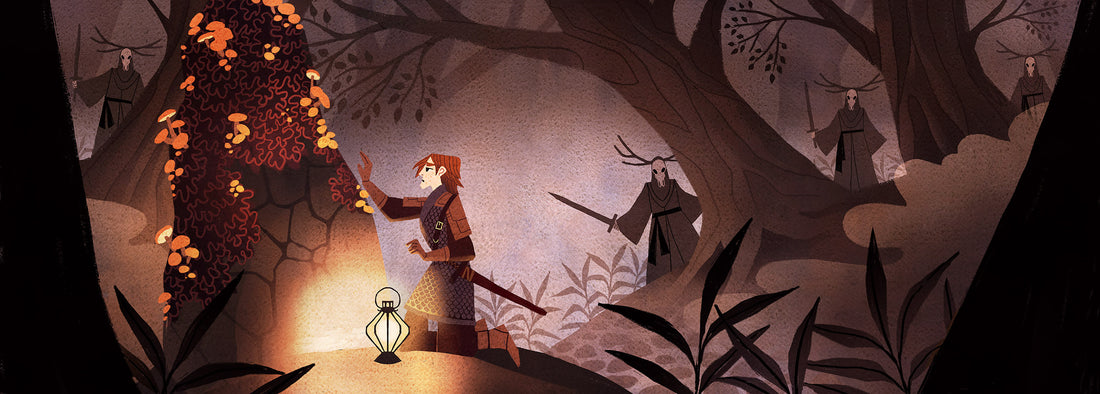
Dolmenwood Player's Book — New Material
Share
(Header art by Pauliina Hannuniemi.)
Built around the acclaimed Old-School Essentials rules, Dolmenwood presents a familiar game with a unique new setting inspired by folklore, fairy tales, and weird fiction. Streamlined rules and helpful introductory materials guide new players, while veteran players experience a fresh sense of the unknown, with new character options, magic, monsters, and treasures.
Dolmenwood is coming to Kickstarter around July / August 2023! Sign up for our newsletter to be kept updated.
This post delves into the reams of new game material in the Dolmenwood Player’s Book. (All of which can also easily be used in Old-School Essentials games set outside of Dolmenwood.)
In future posts, we'll look into the Dolmenwood Campaign Book and the Dolmenwood Monster Book.
Starting Play
- Introduction to RPGs.
- Glossary of common game terms.
- Optional procedures for rolling starting equipment instead of buying.
- Full example of character creation.
- Descriptions of 12 languages unique to the setting.
Kindreds
- Overview of the 3 types of kindreds: mortal, fairy, demi-fey.
- 6 playable Kindreds, each with recommended / restricted classes, special abilities, illustrations, a table of names, a table of backgrounds, a table of trinkets, and 8 flavour tables.
- Breggle: Proud goatfolk whose horn length determines their social standing.
- Elf: Wanderers from Fairy, wielders of innate fairy glamours.
- Grimalkin: Shape-shifting cat fairies.
- Human: Gain some special abilities (like in OSE Advanced Fantasy).
- Mossling: Gnarled, woody humanoids whose fertile flesh hosts mosses, moulds, and fungi.
- Woodgrue: Bat-faced goblins with a penchant for music and arson.
Classes
- Cleric: 3 holy orders, each granting a special ability. (The orders of St Faxis, St Sedge, and St Signis.)
- Enchanter: An innate wielder of fairy magic.
- Fighter: Combat talents.
- Friar: A wandering holy spell-caster with spells from level 1, turning undead, and abilities around foraging and herbs.
- Hunter: (Variant ranger / beast master, adapted to Dolmenwood.) A wilderness warrior with the ability to track and attract an animal companion.
- Knight: (Variant knight, adapted to Dolmenwood.) A heavily armoured warrior in the service of one of Dolmenwood’s 8 noble houses: House Guillefer, House Harrowmoor, House Hogwarsh, House Malbleat, House Mulbreck, House Murkin, House Nodlock, House Ramius.
- Magician: (Renamed magic-user.) Table of starting spell books, each containing 3 thematic spells.
- Minstrel: (Variant bard, adapted to Dolmenwood.) An adventuring musician and poet with the ability to enchant with music and recognise monsters from folklore.
- Thief: d6 skill system, including optional rules for customising skill progression, Use of all skills greatly clarified.
Magic
- Arcane magic: Many spells clarified or reworked to better fit the flavour of the setting. Some new spells are included.
- Fairy magic: A third type of magic, with 20 glamours and 18 runes. Glamours are innate magical abilities possessed by fairies. Runes are high secrets of fairy magic that may be granted to PCs by a fairy noble.
- Holy magic: Each cleric spell is flavoured around the myths surrounding a particular saint worshipped in Dolmenwood. These myths are presented along with the spells.
- Mossling knacks: Semi-magical knacks practised by mosslings. 6 knacks, each with different powers at level 1, 3, 5, and 7.
Equipment, Services, and Animals
- Expanded list of adventuring gear.
- Adventuring gear items are listed as common (available anywhere) or uncommon (only available in towns and cities).
- 2 new types of armour worn by mosslings: bark armour and pinecone armour.
- Rules for tailoring armour.
- Rules for weapons of special metals (cold iron, silver).
- 6 types of horse: Charger, Dapple-doff, Hop-clopper, Mule, Prigwort prancer, Yellow-flank.
- Land and water vehicles tailored to the setting.
- 8 new types of hound: Bloodhound, Dapper, Dolmen pincher, Lankston mastiff, Lichhound, Pisker, Seelie dog, Spookhound.
- Price lists for poor, common, and fancy lodgings.
- Descriptions of 40 dishes.
- Descriptions of 30 beverages, including rules for inebriation.
- Descriptions of 20 types of pipeleaf, including rules for contemplating while smoking.
- 20 common useful / medicinal fungi and herbs.
- List of specialists and services tailored to the setting.
- Detailed procedures and tables for hiring retainers.
Adventuring
- Introductory guidelines around successful adventuring and the procedures of play.
- Slot-based encumbrance option.
- Clarified and expanded rules around general adventuring hazards and challenges, including expanded rules for finding food in the wild, starvation, jumping, swimming, etc.
- Easy-to-use overland travel system based on daily Travel Points.
- Rules for finding hidden features in wilderness hexes.
- Procedures for camping in the wilds.
- Procedure for settlement exploration and downtime, including lifestyle expenses and guidelines for common town services.
- Expanded options for dungeon exploration, including rules for travelling along safe paths, sleeping in the dungeon, food in dungeons, and exiting the dungeon.
- Clarified combat sequence, noting where actions like turning undead and using magic items occur.
- Explanation of declared actions in combat.
- Optional extra combat rules for Attacking With Two Weapons, Charging Into Melee, Death’s Door, Missile Fire Into Melee, Parrying, Pushing, Splash Weapons, Switching Weapons.
- Full example of play and combat.
Appendices
- A description of the calendar used in Dolmenwood.
- Optional rules for moon signs, granting characters a special ability based on the month and moon phase at their birth.
- Kindred-Classes for players who prefer to play archetypal non-humans: breggle, elf, grimalkin, mossling, woodgrue.
